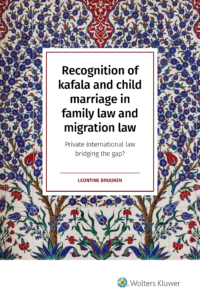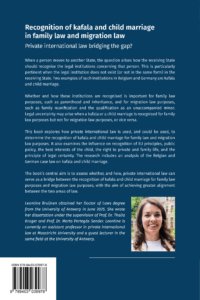Views
Court-to-court referrals and reciprocity between Chinese and Singapore courts
By Catherine Shen, Asian Business Law Institute
In 2023 Su 05 Xie Wai Ren No. 8 dated March 14, 2025, the Suzhou Intermediate People’s Court of Jiangsu Province in China (Suzhou Court) recognized and enforced civil judgment HC/S194/2022 under file number HC/JUD47/2023 by the Supreme Court of Singapore (Singapore Judgment). The judgment by the Suzhou Court (Suzhou Judgment) was announced in September 2025 by the Supreme People’s Court of China (SPC) as among the fifth batch of Belt and Road Initiative (BRI) model cases. Read more
CJEU, Case C-540/24, Cabris Investment: Jurisdiction Clause in Favour of EU Court is Subject to Art. 25 Brussels Ia even if both Parties are Domiciled in the Same Third State
By Salih Okur, University of Augsburg
On 9 October 2025, the CJEU, in Case C-540/24 (Cabris Investment), had to decide whether Art. 25 Brussels Ia applies to “an agreement conferring jurisdiction in which the contracting parties, who are domiciled in the United Kingdom and therefore (now) in a third State, agree that the courts of a Member State of the European Union are to have jurisdiction over disputes arising under that contract, falls within the scope of that provision, even if the underlying contract has no further connection with that Member State chosen as the place of jurisdiction.“
Unsurprisingly, the Court held that it does.
Pre-print article on SSRN on “Mirin” and the Future of Cross-Border Gender Recognition
I recently published the pre-print version of an article on SSRN that was accepted by the International Journal of Law, Policy and the Family. The article is called ““Mirin” and Beyond: Gender Identity and Private International Law in the EU“. The article is part of a special issue dealing with questions of gender identity that (probably) will come out at the beginning of 2026.
As it deals with matters of private international law (regarding gender identity) and the CJEU decision “Mirin”, I thought it might be interesting for the readers of this blog to get a short summary of the article. If it sparks your interest, of course, I would be glad if you consider reading the whole text – and to receive feedback and further thoughts on this topic. 🙂
News
Revisiting the Internationality of Contracts: Conference in Paris, 9 February 2026
The international character of contracts is currently undergoing significant transformations. Whether deliberately chosen by the parties, rejected by domestic courts, endured in certain regulatory contexts, or even rendered obsolete, the notion of internationality – long considered a cornerstone of private international law – calls for renewed analysis. Against this background, a conference entitled “Revisiting the Internationality of Contracts” will be held on Monday, 9 February 2026 from 9:00 a.m. to 6:00 p.m. in the Grand Chamber of the French Court of Cassation.
List of China’s Cases on Recognition of Foreign Judgments [2025 Update]


As the new year begins, it’s a good time for a fresh start. One timely occasion to do so is the release, on 31 December 2025, of the annual update of the List of China’s Cases on Recognition of Foreign Judgments (Case List), prepared since 2019 by China Justice Observer (CJO), founded by Guodong Du and Meng Yu (updates for the years 2020, 2022, 2023, and 2024 were also previously posted on this blog).
The Case List is compiled on the basis of a collection of “all Chinese court decisions involving the recognition and enforcement of foreign judgments (REFJ), as well as foreign decisions concerning the recognition and enforcement of Chinese judgments.” The stated intention behind this endeavor is to “build reasonable expectations on REFJ in China.”
The Case List constitutes a particularly valuable source of information on judicial practice relating to the recognition and enforcement of foreign judgments in China, both under international treaties concluded by China (for a full list, see here) and under domestic law, namely the Civil Procedure Law of the People’s Republic of China (2023 Amendment), Articles 298–303.
According to the 2025 update, a total of 120 cases involving China and 26 foreign States and regions, excluding foreign divorce judgments, have now been collected. This represents an increase of 11 cases compared to the previous update (109 cases in the 2024 update).
Key features of the 2025 update include the following:
-
The List comprises 26 concise reports for each jurisdiction, together with a chart of bilateral judicial assistance treaties which China has concluded with 39 States, of which 35 bilateral treaties include judgment enforcement clauses.
-
A total of eleven newly added cases involve one treaty jurisdiction – Uzbekistan (one case), and five non-treaty jurisdictions, namely, Australia (one case), New Zealand (four cases), Singapore (two cases), South Korea (two cases), and the United States (one case).
-
Please note that Tian v Xu [2023] NZHC 3259 marks the first reported instance of a New Zealand court recognizing and enforcing a Chinese civil settlement statement (also known as a mediation judgment). By treating such instruments as equivalent to consent judgments, the New Zealand High Court has adopted a pro-enforcement approach consistent with precedents in Canada (Wei v Li 2019 BCCA 114) and Australia (Bank of China Limited v Chen [2022] NSWSC 749), providing a clear contrast to the earlier restrictive view expressed in Singapore (Shi Wen Yue v Shi Minjiu & Anor [2016] SGHC 137).
-
Another noteworthy case is Sunvalley Solar Inc. v Baoding Tianwei Solarfilms Co. Ltd. (2019) Ji 01 Xie Wai Ren No. 3, where a Chinese court refused to enforce a U.S. default judgment rendered in breach of a valid arbitration agreement. By holding that a defendant’s absence does not constitute an implied waiver, the Chinese court shielded arbitration clauses from being bypassed via foreign default judgments.
-
Other newly added cases, be it foreign judgments to be enforced in China or Chinese judgments to be enforced in foreign jurisdictions, provide a valuable comparative perspective on key issues in the eyes of courts from different jurisdictions, such as reciprocity ( e.g., the de jure reciprocity applied by a Beijing court in enforcing a South Korean IP judgment, the reciprocal consensus confirmed by a Shanghai court in enforcing a Singapore monetary judgment), natural justice (New Zealand), ascertainment and interpretation of foreign law (Singapore, Australia).
-
Each case has been reviewed, and more details, such as the grounds, the case numbers, and causes of action, have been added.
-
Case analyses have been aggregated under the country tags since 2022, so it is now easier to track down relevant cases, together with their information and analyses, in each country/region report. For example, under the tag ‘US-China Judgments Recognition and Enforcement’, one can find relevant case analyses involving mutual recognition and enforcement of judgments between the US and China.
For further details see here and here.
Happy New Year to all!

[Out Now] Bruijnen on Recognition of Kafala and Child Marriage in Family Law and Migration Law


Leontine Bruijnen (Maastricht University) has recently published a book titled Recognition of kafala and child marriage in family law and migration law (Wolters Kluwer, 2025) based on her dissertation written under the supervision of Prof. Dr. Thalia Kruger and Prof. Dr. Marta Pertegás. Read more



